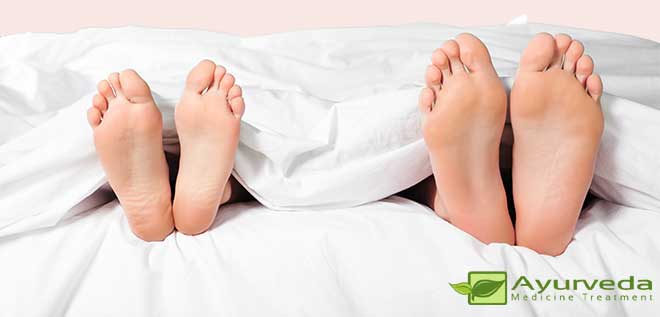
Bed Wetting Syndrome: This is a typical night-time syndrome manifesting among the children. In some instances, this habit continues till teenage. Though both the sexes may have this involuntary nocturnal urination, yet it has been found to be more so in the cases of boys.
Who are prone to the Bed Wetting Syndrome?
Generally, the children in the post-five-year stage can exercise adequate control over their urinary sphincters. Then they pass urine only when they want to. But owing to certain reasons in some cases, those kids fail to have control over the urge to urinate. This leads to the bed-wetting syndrome at night.
Mentionably, such a person may urinate more than once at night. It has also been found that the syndrome passes on from one generation to another. Either the parents of the patient or the siblings or both have been found to be suffering from the same ailment when they were young.
The causes of bed wetting
Usually, children who are nail baiters or thumb suckers suffer from this syndrome.
However, clinically two factors have been identified as responsible for the syndrome, viz. emotional and physical.
The Emotional Factors: There are 10 such reasons. These are nightmares; insecurity; adjustment problems in school; failure to get proper attention from parents; sibling rivalry; conflict among parents and children; conflict between parents; shyness; emotional immaturity and attempts to empty the urinary bladders earlier than required.
The Four Common Physical Factors: Intestinal worms at times cause pain in the tummy. This, in turn, spurs on a reflex action in the child. It, then, manifests as the urine passing or the bed-wetting syndrome.
In some cases, thread worms wriggle out of the anus of the children at night. In the process, they cause irritation. The resultant reflex action causes the children to urinate.
The third cause can be organic defects in the urinary tract.
The bed wetting syndrome can also be caused by infection of the kidney or the bladder.
Dietary Regimen to control bed wetting
The patient should be given adequate leafy vegetables, drumsticks, radish, spinach, cabbage, cauliflower, tomato, potato, gourd, pumpkin, bitter gourd and patola.
What not to Do
Ensure that the patient does not suffer from constipation.
Don’t give the patient pulses and any other spicy food items. These food items not only lead to wind formation (flatulence) but also constipation.
The patient must not be given any liquid during suppers.
Such persons should not be allowed to drink water after the sun sets.
Other Regimen
Take the child on regular evening walks. It gives the child mental strength and homely affection. This also go a long way in overcoming all forms of fear complexes which constitute one of the primary causes of the syndrome.
Ensure that the patient lives in a homely environment. Foster friendship and affection among the siblings and also among the parents and the children in general. Healthy relationship between the parents goes a long way in curing the bed-wetting syndrome.
The patient must be given treatment if he/she suffers from constipation. Regular bowel movements obviate the possibilities of the thread worms wriggling out of the anus.
Don’t let the patient sleep on rubber mattresses. It leads to insomnia or sleeplessness which can spur on the syndrome.
Identify the cause and pinpoint the syndrome time
It is of utmost importance that the guardians first identify the main cause of the syndrome. All or any emotional or physical cause should be rectified.
The parents should also pinpoint the time range when the syndrome manifests. The strategy is to wake up the child 30 minutes before that ‘critical’ time, and make him urinate in the bathroom.
Besides, make the child answer nature’s call prior to retiring for the night. It should, in fact, be turned into a habit.
Don’t carry the child in a half-awakened mood to the bathroom. Instead wake up him/her and make him walk up to the bathroom to ease himself/herself.
One can also give rewards to the child for not resorting to bed-wetting. This method helps in most of the cases and the child is able to enjoy dry nights.
Don’t let the child have water or any liquid after sunset and also during meals especially at night.
Avoid scolding or castigating the child.
Ayurvedic Treatment of Bed Wetting Syndrome
Ayurvedic medicines strengthen the child’s urinary tract as well as the entire nervous system. Over a period, the Ayurvedic medications help the child to gain control over the urinary sphincters. This controls and cures the bed-wetting syndrome.
The commonly prescribed Ayurvedic treatment is Shilajit. This ingredient is mixed with various other items to form the different medications. One of the popular medications is Chandra prabha vati.
Chandra Prabha Vati
The Ayurvedic practitioners commonly prescribe Chandra prabha vati to such patients. It comes in the tablet (pill) form of 0.250 gm. It specifically addresses all geneto-urinary complaints. While curing the geneto-urinary problems, Chandra prabha vati also strengthens the geneto-urinary as well as the entire nervous system.
The dose: Children up to five years of age need to be given half a tablet both in the morning and in the evening. It should be mixed with a cup of milk and taken in an empty tummy.
On the other hand, children beyond 10 years of age can take a full tablet mixed with milk twice daily.
Shilajit for Web Wetting
If one takes Shilajit over a long period of time, the medication will produce heat within the body. Hence, the winter season is ideal for consuming the medicine. However, in the summer season, the dose should be reduced by 50%.
The dose: Children in the five years bracket should be given only one-fourth of a gram twice daily. The medicine needs to be mixed with milk before consumption. It should be taken in an empty tummy.
In the teenage group, the dose is of half a gram of the medicine twice daily.







Leave a Reply